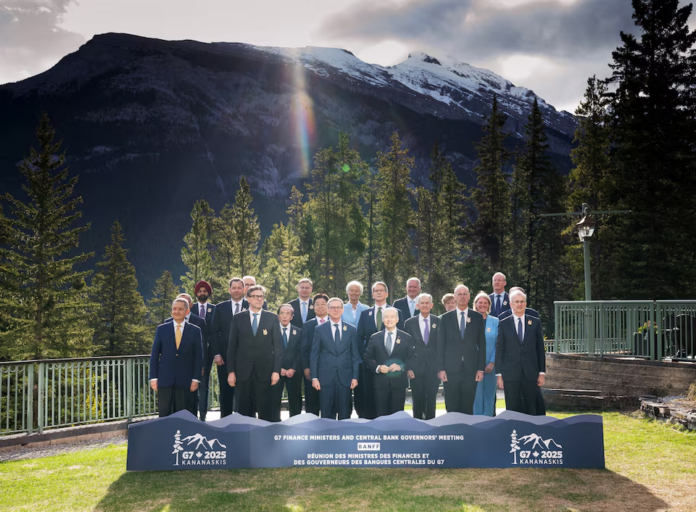Finance leaders from the Group of Seven industrialized democracies met in the Canadian Rocky Mountains on Wednesday to seek common ground amid ongoing disputes over U.S. President Donald Trump’s tariffs.
The ministers aimed to keep the forum viable by focusing on non-tariff issues, including support for Ukraine, addressing non-market economic policies from countries like China, and combating financial crimes and drug trafficking.
U.S. Treasury Secretary Scott Bessent described the day as productive following his bilateral meetings, signalling a more cooperative atmosphere compared to the fractured G7 finance meeting in 2018, which had been disrupted by Trump’s initial steel and aluminium tariffs. This year’s tariffs are broader, but officials reported efforts to find compromise with the U.S. Treasury.
French Finance Minister Eric Lombard noted a marked improvement in discussions with Bessent and expressed willingness to forgo a joint statement if it meant progress on reducing trade imbalances, enhancing growth policies, and supporting Ukraine. Meanwhile, Italy’s Economy and Finance Minister Giancarlo Giorgetti emphasized the importance of reaching an agreement on a communique.
Disagreements remain over the language describing Russia’s invasion of Ukraine, with some U.S. officials pushing to remove terms labelling the invasion as “illegal.” Italy is advocating for excluding countries that have supported Russia’s war efforts from participating in Ukraine’s reconstruction, aligning with Bessent’s previous statements that those who financed or supplied the Russian military should be barred from reconstruction funds.
Delegates also discussed lowering the existing $60-per-barrel G7 price cap on Russian crude oil, with the European Union seeking a reduction as part of its 18th sanctions package targeting Russian energy and sanction circumvention financing.
Despite uncertainties over a joint communique, Bessent’s active participation has been seen as a calming influence, providing some reassurance to the group. The U.S. Treasury’s focus remains on addressing global economic imbalances through stronger G7 actions against non-market practices like China’s subsidies, rather than through tariffs.
In bilateral talks, Bessent and Japanese Finance Minister Katsunobu Kato agreed that the current dollar-yen exchange rate reflects fundamentals, without discussing specific currency levels. Currency tensions remain relevant as Japan negotiates a trade deal with the U.S. aimed at reducing tariffs.
Canadian Finance Minister Francois-Philippe Champagne and Germany’s new Finance Minister Lars Klingbeil also held constructive discussions with Bessent, with plans for further meetings in Washington.
Several G7 countries, including Japan, Germany, France, and Italy, face potential increases in U.S. duties to 20% or more starting in July, while Britain remains subject to a 10% tariff on most goods under a limited trade deal. Canada continues to contend with a separate 25% U.S. duty on many of its exports.























